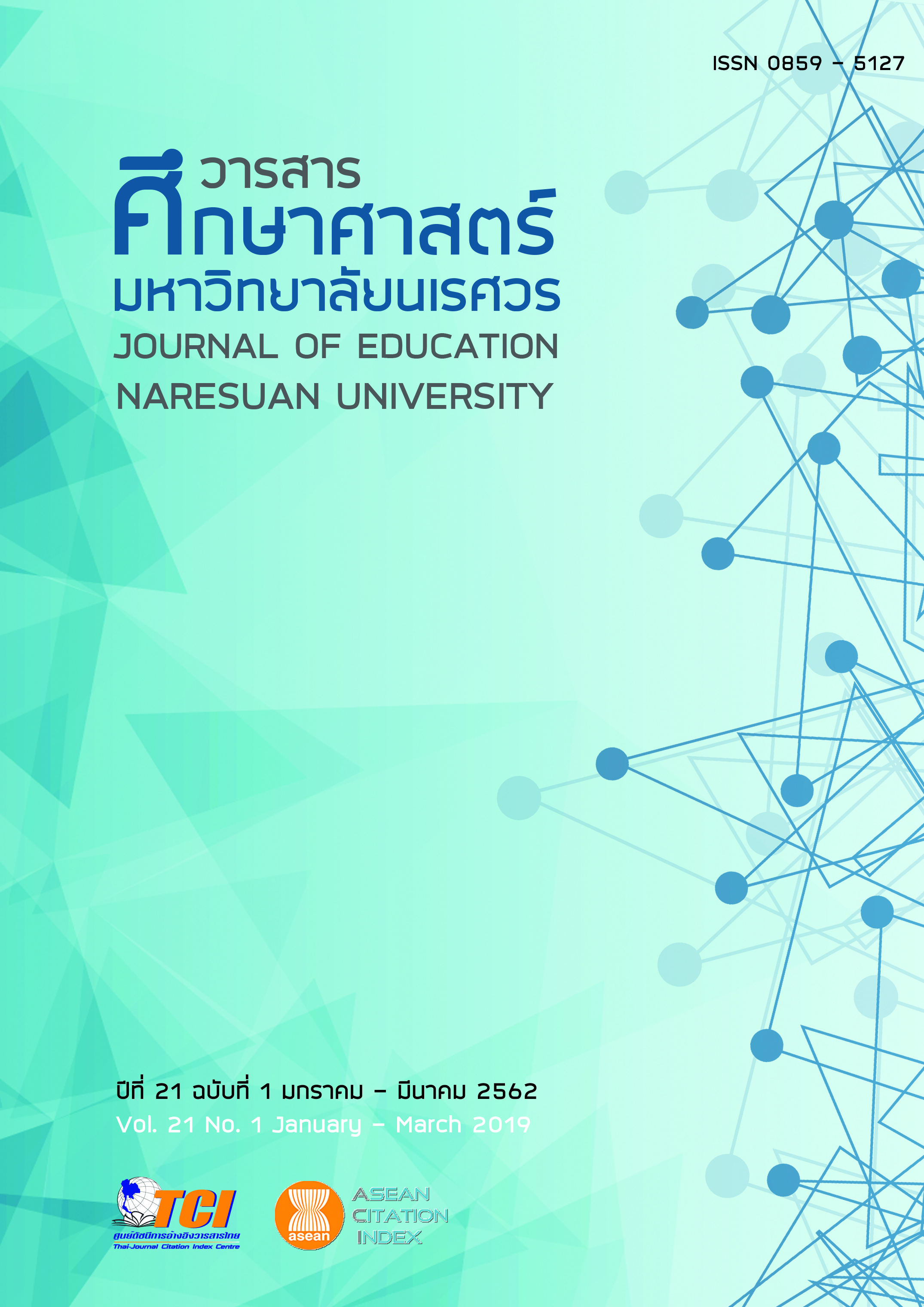การพัฒนาหลักสูตรเสริมสมรรถนะการออกแบบการจัดการเรียนรู้โดยใช้กระบวนการชี้แนะและการเป็นพี่เลี้ยง สำหรับครูในสังกัดองค์กรปกครองส่วนท้องถิ่น (THE DEVELOPMENT OF CURRICULUM TO ENHANCE LEARNING DESIGN COMPETENCE ON COACHING AND MENTORING FOR MUNICIPALITIES TEACHERS)
Main Article Content
Abstract
การวิจัยครั้งนี้มีวัตถุประสงค์เพื่อพัฒนาหลักสูตรเสริมสมรรถนะการออกแบบการจัดการเรียนรู้ โดยใช้กระบวนการชี้แนะและการเป็นพี่เลี้ยง สำหรับครูในสังกัดองค์กรปกครองส่วนท้องถิ่น ดำเนินการตามระเบียบวิธีวิจัยและพัฒนา 4 ขั้นตอน ดังนี้ 1) ศึกษาสภาพและปัญหาการออกแบบการจัดการเรียนรู้ และแนวทางการพัฒนาสมรรถนะการออกแบบการจัดการเรียนรู้ 2) สร้างและตรวจสอบคุณภาพของหลักสูตร ศึกษานำร่องการใช้หลักสูตร 3) ทดลองใช้หลักสูตร 4) ประเมินหลักสูตร การดำเนินกิจกรรมของหลักสูตรประกอบด้วยกระบวนการชี้แนะ 4 ขั้นตอน ได้แก่ 1) การระบุสถานการณ์ปัญหาหรือขัดข้อง 2) การกระทำและการเปลี่ยนแปลง 3) การตระหนักรู้ในตนเอง และ 4) การนำไปสู่การปฏิบัติและให้ข้อมูลป้อนกลับ และทำหน้าที่เป็นพี่เลี้ยงคอยให้คำปรึกษาแก่ครู กลุ่มเป้าหมาย ได้แก่ ครูระดับประถมศึกษาในสังกัดเทศบาลเมืองสวรรคโลก จำนวน 15 คน วิเคราะห์ข้อมูลโดยการหาค่าร้อยละ ค่าเฉลี่ย ค่าเบี่ยงเบนมาตรฐาน การวิเคราะห์เนื้อหา และสถิติทดสอบ t-test แบบ One Sample Test ผลการวิจัย พบว่า
1. ครูในสังกัดองค์กรปกครองส่วนท้องถิ่นมีปัญหาในการออกแบบการจัดการเรียนรู้ในระดับปานกลาง
2. หลักสูตรมีความเหมาะสมในระดับมาก เมื่อนำไปศึกษานำร่อง พบว่า หลักสูตรมีความเป็นไปได้ต่อการนำไปใช้
3. หลังการใช้หลักสูตรเสริมสมรรถนะการออกแบบการจัดการเรียนรู้ ครูมีความรู้และสามารถออกแบบการจัดการเรียนรู้ สูงกว่าเกณฑ์ร้อยละ 75
4. ครูมีความคิดเห็นว่าหลักสูตรมีความเหมาะสมด้านปัจจัยเบื้องต้น ด้านกระบวนการและด้านผลผลิตในระดับมาก
THE DEVELOPMENT OF CURRICULUM TO ENHANCE LEARNING DESIGN COMPETENCE ON COACHING AND MENTORING FOR MUNICIPALITIES TEACHERS
The study has following objectives to the development of curriculum to enhance learning design competency on coaching and mentoring for municipalities teachers. Research methodology was conducted subject to research and development consisting for four steps. The first step were survey teachers about learning Design and interview experts. The second step were create and monitor the quality of curriculum and pilot studies in using the curriculum. The third step trial the curriculum. The fourth step assessment the curriculum. The course activities of 4 steps: 1) Identifying situations, Problem, or interruptions, 2) Actions and changes, 3) Self-awareness, and 4) Implementing and providing feedback. And act as a mentor to counsel the teachers. Target group consisted of 15 primary school teachers in Sawankhalok Municipality. In analyzed data using the statistics by mean, standard deviation, content analysis and t-test; one sample test. The study found that:
1. Municipalities teachers had moderate problems in learning design.
2. The curriculum was highly appropriation and the pilot study the curriculum was feasibility to apply.
3. After using the enhance curriculum, the teachers had higher knowledge and ability to learning design than 75%.
4. The opinion of teachers that the enhance curriculum was appropriate for basic factors, processes and productivity at a high level.
Article Details
The owner of the article does not copy or violate any of its copyright. If any copyright infringement occurs or prosecution, in any case, the Editorial Board is not involved in all the rights to the owner of the article to be performed.
References
Chuenklin, T. (2010). Development of coaching model for developing Learning competencies of nursing Instructors promoting critical thinking skills of nursing students under the Praboromarajchanok Institution Ministry of Public Health (Doctoral dissertation). Bangkok: Silpakorn University. [in Thai]
Garica-Guerra. (2001). Content coaching: Process that define it and the characteristics of these who coach (Doctoral dissertation). Cambridge, MA: Harvard University.
Homhuan, D., Kaewurai, W., Yatale, T., & Onthanee, A. (2016). The development of curriculum to encourage learning management competency for community college teachers. Journal of Education Naresuan University, 18(2), 13-24. [in Thai]
Khammani, T., et al. (2004). Research on and Development of learning reform model for whole school. Bangkok: Chareon printing. [in Thai]
Knowles, M. S. (1978). The adult learner: A neglected species (22nd ed.). Huston: Gulf.
Kongterm, S., Kaewurai, W., Prachaban, P., & Narongsarasak, O. (2011). Development of training curriculum for enhancing thinking ability for teachers under the Office of Basic Education Commission. Journal of Education Naresuan University, 13(Special), 95-116. [in Thai]
Kongterm, S. (2013). Development of online training curriculum for teacher competency enhancement under the Office of the Basic Education Commission. Phetchabun: Faculty of Education, Phetchabun Rajabhat University. [in Thai]
Munson, B. (1998). Peers observing peers: The better way to observe teachers. Contemporary Education, 69(2), 108-110.
Panakul, S. (1999). Evaluation of curriculum. Bangkok: Ramkhamhaeng University Printing. [in Thai]
Phanlert, C. (2006). Development of academic mentors’ coaching competency enhancement process using Experiential Learning in school-based training (Doctoral dissertation). Bangkok: Chulalongkorn University. [in Thai]
Rakpojanat, S. (2004). On the battle of the local science trail. Bangkok: Fund Office Research Support (TRF). [in Thai]
Saengloetuthai, C. (2007). The development of enrichment curriculum to enhance Information Communication Technology (ICT) competency for students of the teaching profession (Doctoral dissertation). Bangkok: Srinakharinwirot University. [in Thai]
Sompongthum, C., Anannawee, P., & Khonchalad, K. (2010). A study of trends of Thai teachers in the next decade (2019). Retrieved from www.ksp.or.th/ksp2009/upload/ ksp_kuru_research/research/files/2223-4625.pdf [in Thai]
Suttirat, C. (2013). Curriculum development theory to practice. Bangkok: V Print. [in Thai]
Taba Hilda. (1962). Curriculum Development: Theory and practice. New York: Harcourt Brace and World.
Wongyai, W. (1994). Curriculum development and instructional process. Bangkok: Suweeriyasan. [in Thai]


